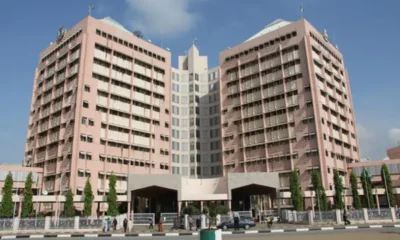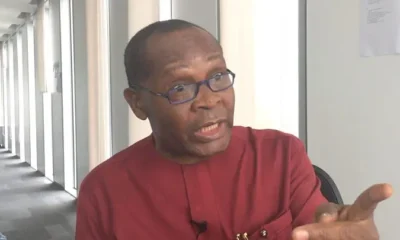News
Student loan: NELFUND kicks as institutions hike tuition fees, charges for profit

• Edo, Ondo, Ebonyi varsities, LAUTECH flagged
• Fees for Medicine, Nursing, Law rise by 20%
• Kogi Polytechnic raises charges by over 1,000%
The Nigerian Education Loan Fund (NELFUND) has expressed concern over the astronomical increase in tuition fees by some institutions, ranging between 20 and 521 per cent, The Guardian has learnt.
A document obtained from the Fund’s internal risk management unit noted that the recent surge in tuition fees across various institutions, particularly for programmes such as Medicine, Nursing, and Law, has placed a significant financial burden on students and strained the Fund’s operations.
Titled ‘Report on Framework to Mitigate the Impact of Increased Institutional Charges on the Fund’s Operations,’ the document listed the affected institutions as the University of Ilesha, Osun State; Ekiti State University; University of Medical Sciences, Ondo; Edo State University; Ladoke Akintola University of Technology (LAUTECH), Oyo State; and David Umahi Federal University of Health Sciences (DUFUHS), Ebonyi State.
This development comes barely six months after The Guardian reported that at least 51 institutions had been implicated in illegal deductions and exploitation of the scheme.
In July this year, the newspaper also reported that the Fund had rejected loan applications from 10 tertiary institutions due to excessive fee hikes of up to 900 per cent.
Giving details of the increases, the report obtained by The Guardian indicated that the University of Ilesha raised its Nursing programme fee from N825,000 to N1.276 million, representing a 55 per cent hike, while the Law programme rose from N1.276 million to N1.526 million, a 20 per cent increase.
The document showed that Ekiti State University increased its Medicine and Surgery fee from N797,000 to N1.132 million, representing a 42 per cent hike. Similarly, Edo State University raised the same programme’s fee by N1 million, from N3.250 million to N4.250 million, representing a 31 per cent hike.
This means that a medical student at Edo State University, studying from 100 to 600 level, would graduate with a debt burden of over N51 million.
For the University of Medical Sciences, Ondo, the report indicated that the state-owned institution significantly raised tuition fees for three courses, with increases ranging from 40 to 149 per cent.
The document revealed that the school’s Nursing charges rose by 149 per cent, from N900,000 to N2.245 million, an increase of N1.345 million. Similarly, the Community Health programme rose from N1.2 million to N1.683 million, representing a 40 per cent increase, while Medicine and Surgery spiked from N1.320 million to N2.245 million, a 70 per cent hike.
Also mentioned was LAUTECH, which increased its Medicine and Surgery programme fee from N126,000 to N782,000; a 521 per cent increase. The school also raised its Biomedical and Nursing programme fees by 410 per cent, marking a significant increase of N516,000 respectively.
For David Umahi Federal University of Health Sciences (DUFUHS), Ebonyi State, the tuition fee for Medicine and Surgery was increased by about 46 per cent, from N1.030 million to N1.5 million.
In the lead-up to the reopening of the student loan portal last October, it was observed that some institutions had significantly increased their tuition fees. They include the Federal University of Agriculture, Abeokuta (FUNAAB), which raised institutional charges for all levels by between 25 and 67 per cent; Federal University, Oye-Ekiti (FUOYE), by between 10 and 120 per cent; and Kogi State Polytechnic, by between 115 and over 1,000 per cent.
NELFUND may halt disbursements to defaulting schools
To mitigate the impact of increased institutional charges on the Fund’s operations, the committee made far-reaching recommendations, including pausing disbursements to schools with extreme increases pending review, capping loans for affected institutions until a long-term solution is finalised, or temporarily halting loans to institutions where fee hikes exceed 100 per cent until a thorough review is conducted.
For long-term strategies, the report urged the Fund to collaborate with the Federal Ministry of Education to establish national fee guidelines, publish updated loan policies and fee thresholds on the agency’s website, and allow students to report unfair fee practices anonymously.
According to the Student Loan Disbursement Dashboard released last week, NELFUND had, as of September 26, disbursed over N107.6 billion to 581,878 students across the 36 states and the Federal Capital Territory, Abuja.
A breakdown of the disbursements showed that institutional fees accounted for N61.3 billion, while upkeep allowances amounted to N46.3 billion.
Parents decry fresh increases as NANS demands urgent action
The steep increase in tuition fees after the rollout of the loan scheme in 2024 has fuelled calls for tighter regulations.
It has also triggered fears of possible exploitation by universities, polytechnics, and colleges of education, leading to protests by students and parents in several affected institutions.
A concerned parent, Alabi Ademola, called for the intervention of the federal and state governments in the affected states. Ademola cautioned that if left unchecked, it would undermine President Bola Tinubu’s efforts to support indigent students.
While calling for a cap on tuition, Ademola noted that education should be treated as a public good rather than a commodity that places unbearable pressure on struggling households.
“Hiking tuition fees by the institutions is rather unfortunate and can be classified as a corrupt tendency. President Tinubu’s government is trying to help students with poor financial backgrounds to fulfil their educational pursuits, but those who are supposed to assist in actualising it are the ones frustrating the laudable programme,” he lamented.
Education analysts have also cautioned that unchecked tuition hikes could undermine the long-term goals of the loan scheme. They argued that instead of widening access to education, the policy might inadvertently deepen inequality, with only students from relatively privileged homes able to cope with the costs.
On its part, the Education Rights Campaign (ERC) argued that the loan scheme is worsening the crisis in the higher education sub-sector instead of solving it.
The National Mobilisation Officer of the group, Michael Adaramoye, described the policy as “a debt trap” that threatens to push millions of Nigerian students into long-term financial hardship.
“This is one of the precarious crises the students’ loan scheme is creating in the education sector; in fact, it is a logical consequence of the scheme and further reinforces the argument that a loan scheme is inimical to public education,” Adaramoye said. “The idea that loans will cushion this burden is false. Loans are not relief; they are debt traps.”
According to him, the sharp rise in tuition fees since the scheme’s introduction is a direct outcome of the government’s policy. He argued that many administrators of tertiary institutions now justify fee hikes by referring students to the loan programme, despite knowing that it cannot cater to all students.
Adaramoye accused the government of commercialising education and abandoning its constitutional responsibility to fund learning.
He noted that across the world, student loan schemes have led to generational indebtedness without resolving the underlying issue of chronic underfunding.
He further called for the immediate reversal of all increments implemented since the loan scheme took effect, insisting that no institution should charge tuition above the national minimum wage of N77,000.
“A serious government will not turn its young population into debtors; the viable alternative, and the only way to ensure access to education for Nigerians, is for public education to be properly funded and democratically managed by students and staff through their unions,” he stated.
The group also demanded that the loan programme be scrapped and replaced with grants targeted at indigent students.
Adaramoye urged students, education workers, and pro-education organisations to unite in pressing the government to prioritise free and quality education and make it accessible to all Nigerians.
In its intervention, the National Association of Nigerian Students (NANS) called on the Federal Ministry of Education to take urgent steps by imposing a loan restriction on erring institutions.
In a telephone interview with our correspondent, the NANS Public Relations Officer, Adeyemi Ajasa, explained that the association has directed its state and zonal branches to handle the issue at their level first. Should those efforts fail, he added, the national leadership of NANS would be compelled to step in directly.
Ajasa recalled that the South-West zonal leadership, alongside state representatives of the association, convened a meeting last week to deliberate on the situation.
He emphasised that with regard to the Federal University Oye-Ekiti (FUOYE), the association’s position has not changed, insisting that the disputed fees or charges should remain at the existing level.
He stressed that NANS would not stand by while students are unfairly burdened with excessive financial demands, as this contradicts the fundamental goal of education being accessible to all.
The student leader stressed that raising tuition at this time is difficult, adding that although institutions had previously justified the hike by citing fuel price increases and inflation, these arguments no longer hold water, given that the situation has been relatively stable for more than a year.
“Unfortunately, it’s true that some institutions are again going to increase their tuition for the 2025/2026 academic session, aside from the one they increased earlier. When NELFUND was introduced and the fuel subsidy was removed, most institutions hiked their fees, and a lot of negotiations took place for a reduction.
“But what we discovered is that as they are resuming for a new session, they are implementing a new school fee. An example is FUOYE. This is their second time increasing school fees in recent times.
“These institutions look more at the fact that this loan will cover it for students and that they will be able to pay 100 per cent. But they should realise that not all students applied for this loan. And this is something that even those who took the loan will pay back,” he said.
Education on concurrent list, says FG as institutions react
However, the Senior Assistant Registrar (Corporate Service and Information Unit) of the University of Ilesha, Babatunde Fanawopo, attributed the increment to current economic realities and the need to maintain academic quality.
Fanawopo, however, disclosed that the institution offers tuition-free programmes in Education and Agriculture because those are the future of Nigeria and the world.
On concerns that the excessive charges could overburden the loan scheme, Fanawopo said, “Nothing good comes cheap,” adding, “Our tuition is about the cheapest in terms of those two programmes: Law and Nursing. And we’re giving the best.”
The same reason was given by the Acting Head, Directorate of Public Relations at FUNAAB, Olasunkanmi Olajide. According to him, “School charges were raised in conformity with the reality of prices in the country.”
When contacted, UNIMED’s Public Relations Officer, Isaac Oluyi, declined to comment, asking how our reporter got his information when he is not based in Ondo State.
In the same vein, the spokesperson for David Umahi Federal University of Health Sciences, Ebonyi State, Nnenna Eteang, insisted that due process was followed.
While FUOYE’s Public Relations Officer, Foluso Ogunmodede, disclosed that normalcy has returned and the hike has been reversed, his counterparts at Edo State University, Kelly Amaechi, and Kogi State Polytechnic, Uredo Omale, promised to call back but never did, despite several follow-up phone calls and messages.
Also, the Public Relations Officer of Ekiti State University, Bode Olofinmuagun, said he was not aware of any fee increase. “I’m not aware. I’ll do my own investigation,” he mentioned during a phone interview.
In the meantime, the Federal Ministry of Education has indicated that the Nigerian government may have limited powers to address the situation since education falls under the concurrent legislative list.
Speaking in a telephone interview with The Guardian, the ministry’s Director of Press and Public Relations, Folasade Boriowo, explained: “Education is on the concurrent list, and the interest of the Federal Government is that every child has access to education.”
(Guardian)
-

 News19 hours ago
News19 hours agoFG Files Criminal Charges Against Ozekhome Over UK Property Saga
-

 Business19 hours ago
Business19 hours agoPetrol war: Importers outpace domestic refineries with 62% supply in 2025
-

 News19 hours ago
News19 hours agoN30bn relief: Oyo cries politics as HEDA drags Makinde to EFCC
-

 Business19 hours ago
Business19 hours agoMDAs Allocate Billions For Stationeries Despite Paperless Operation
-

 Politics18 hours ago
Politics18 hours ago‘Gear Up, Not Give Up’ Amidst Rivers State Turmoil – Jonathan Tells Fubara
-

 Opinion14 hours ago
Opinion14 hours agoPolitics behind failed impeachment attempt of Gov. Fubara
-

 Politics19 hours ago
Politics19 hours ago‘We Don’t Want A Mole’ – Igbokwe Speaks On Atiku’s Son’s Move To APC
-

 Sports19 hours ago
Sports19 hours agoDrama as Senegal beat Morocco to claim AFCON title


















